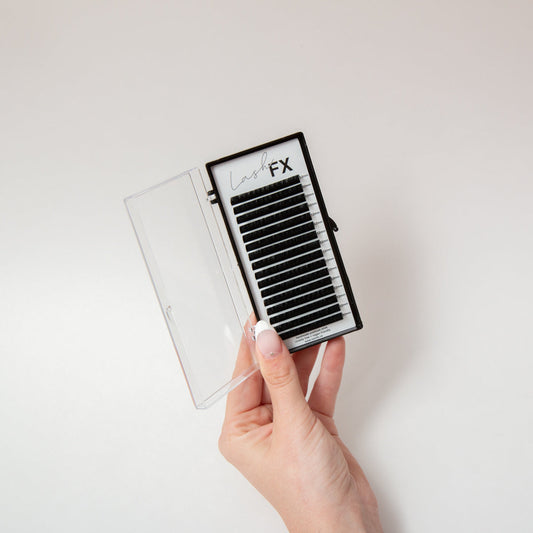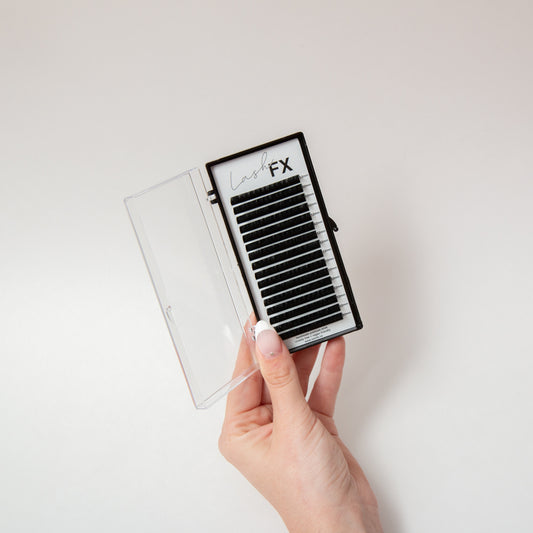In today's booming beauty landscape, lash extensions have risen from a luxury to a staple in many beauty routines. With this surge in popularity, there's an increasing demand for qualified professionals to apply them. But when diving into the world of lash enhancements, two terms frequently pop up: licensed and certified lash techs. For those looking to invest in this beauty service, or even aspiring lash technicians themselves, understanding the distinction between these credentials is paramount. In this guide, we'll delve deep into the nuances of being a licensed vs. certified lash tech, shedding light on what each entails and why they're crucial in ensuring both safety and quality.
Inside this Article:
1. Defining the Terms:
Licensed Lash Technician:
Licensing, in the world of beauty and specifically for lash techs, refers to the official permission granted by a governmental or regulatory body. To become a licensed lash technician, individuals typically need to undergo a specific number of training hours and pass a state or country-specific exam. This process ensures that the technician adheres to local health and safety standards, providing a baseline level of trust for clients seeking lash services.
Certified Lash Technician:
Certification, on the other hand, is often provided by professional organizations or training institutions. It demonstrates that a lash tech has completed specialized courses and met certain criteria set by the certifying body. Unlike licensing, certification isn’t always legally required, but it serves as a badge of professionalism, showcasing the technician's commitment to their craft and keeping updated with the latest techniques and industry trends.
2. Key Differences:
Basis of Credibility:
-
Licensing: This is rooted in legal requirements. A licensed lash technician has met state or regional guidelines, ensuring a fundamental standard of practice. Their credentials ensure they're legally qualified to operate, making it a necessity in many regions for anyone looking to offer lash services.
-
Certification: Represents a lash tech's dedication to mastering their craft. It showcases a level of professional expertise obtained after completing courses or training programs. While it might not be a legal mandate, it stands as a testament to a technician's skill set and commitment to professional growth.
Renewal and Continuing Education:
-
Licensing: Often comes with the need for periodic renewal. This might require the technician to complete continuing education units (CEUs) to stay updated on health, safety, and industry practices. Renewal ensures that a technician remains compliant and updated.
-
Certification: Might demand re-certification after a set period or after significant industry advancements. This process often involves undergoing more training or demonstrating updated skills, emphasizing the technician's dedication to staying at the forefront of lash artistry.
Scope of Practice:
-
Licensing: Defines the boundaries of what a technician can legally do. This includes applying, maintaining, and removing lash extensions, ensuring that all procedures align with local health and safety protocols.
-
Certification: Highlights a technician's specialized skills. For instance, a certified technician might be recognized for expertise in volume lashing, hybrid techniques, or specific lash styles. While it doesn’t define legal boundaries like licensing, it underscores areas of specialization and mastery.
3. Why Both Matter:
Consumer Safety:
Ensuring the safety of clients is paramount in the beauty industry. Lash extensions, if applied improperly, can lead to eye infections, allergic reactions, or damage to the natural lashes. A licensed lash technician, having met regulatory health and safety standards, offers a fundamental assurance of safety. On the other hand, certification assures the client of the technician's advanced skill set and adherence to best industry practices. Together, they form a robust framework that prioritizes the well-being of the consumer.
Professional Credibility:
In an industry flooded with beauty experts, standing out is essential. A lash technician who is both licensed and certified conveys a strong professional image. Licensing indicates legal compliance, while certification showcases dedication to craft and ongoing education. For consumers, these credentials become benchmarks of quality, skill, and trustworthiness, making it easier to choose a technician with confidence.
Industry Standards and Updates:
The beauty industry, especially the world of lash extensions, is ever-evolving. New techniques, products, and trends emerge regularly. A licensed technician ensures they're meeting the foundational industry standards. Meanwhile, certification often reflects a technician's commitment to stay updated with the latest advancements. When a lash tech invests in both, it signifies their dedication to delivering the best and most contemporary services to their clients.
4. Tips for Clients Seeking Lash Services:
Red Flags:
When seeking lash services, it's crucial to be aware of potential pitfalls:
- A reluctance to show credentials or dismissive answers about training.
- Unsanitary conditions in the salon or workspace.
- Extremely low prices that seem too good to be true—remember, quality often comes at a cost.
- Reviews or testimonials indicating a pattern of unsatisfied clients or reports of damage. Being mindful of these signs can help clients sidestep unsatisfactory experiences and ensure the safety of their eyes.
Benefits of Investing in Quality Service:
While a technician with both licensing and certification might come with a higher price tag, the advantages are manifold:
- Longer-lasting lash extensions due to expert application.
- Minimized risk of eye infections or damage to natural lashes.
- Tailored consultations and advice based on extensive training.
- Exposure to the latest techniques and trends in lash artistry, ensuring clients receive top-notch service.
In the realm of lash enhancements, investing in superior service yields dividends in both appearance and well-being.
5. For Aspiring Lash Technicians:
Importance of Licensing:
Stepping into the world of lash artistry requires more than passion—it demands legitimacy. Obtaining a license showcases your dedication to the craft and ensures that you operate within the legal guidelines of your region. Besides safeguarding clients' health and safety, it also protects you from potential legal consequences.
The Edge of Certification:
While licensing might be a mandatory starting point, certification elevates your status in the industry. It distinguishes you from competitors by signaling your commitment to advanced training and mastery of specific techniques. Moreover, being certified opens doors to higher-end clientele who seek specialized skills, helping you boost your earnings and reputation.
Continuous Learning is Key:
The beauty industry, particularly lash services, is dynamic. To remain relevant and meet the evolving preferences of clients, it's crucial to engage in continuous learning. Attend workshops, webinars, and industry conferences. Familiarize yourself with the latest products, tools, and techniques. This proactive approach not only enhances your skillset but keeps you ahead of the curve, attracting discerning clients and solidifying your position as a top-tier lash technician.
Networking and Community:
Joining professional organizations or groups dedicated to lash technicians can amplify your growth. These platforms provide opportunities for collaboration, learning from peers, and staying updated on industry news and trends. Building a robust network can lead to referrals, partnerships, and a deeper understanding of the market's nuances, driving your success in the long run.
Final Thoughts:
The world of lash extensions is more than just a fleeting beauty trend; it's a testament to the evolution of beauty standards and practices. As this industry continues to flourish, the distinctions between licensing and certification become increasingly vital for both clients and technicians.
For clients, understanding these differences ensures they make informed decisions, safeguarding their health and ensuring optimal results. For aspiring lash technicians, investing time and resources in both licensing and certification paves the way for a rewarding, reputable career.
As the adage goes, knowledge is power. Whether you're on the quest for the perfect lash set or aiming to make your mark in the industry, being informed about these credentials can make all the difference. Stay enlightened, prioritize quality, and the world of lash artistry will unveil its wonders to you.
Note:
It's important to be aware that licensing requirements for lash technicians may vary depending on your state or country. In some regions, obtaining a license may not be mandatory. Always check with local regulatory bodies or beauty industry associations to understand the specific requirements for your area.










